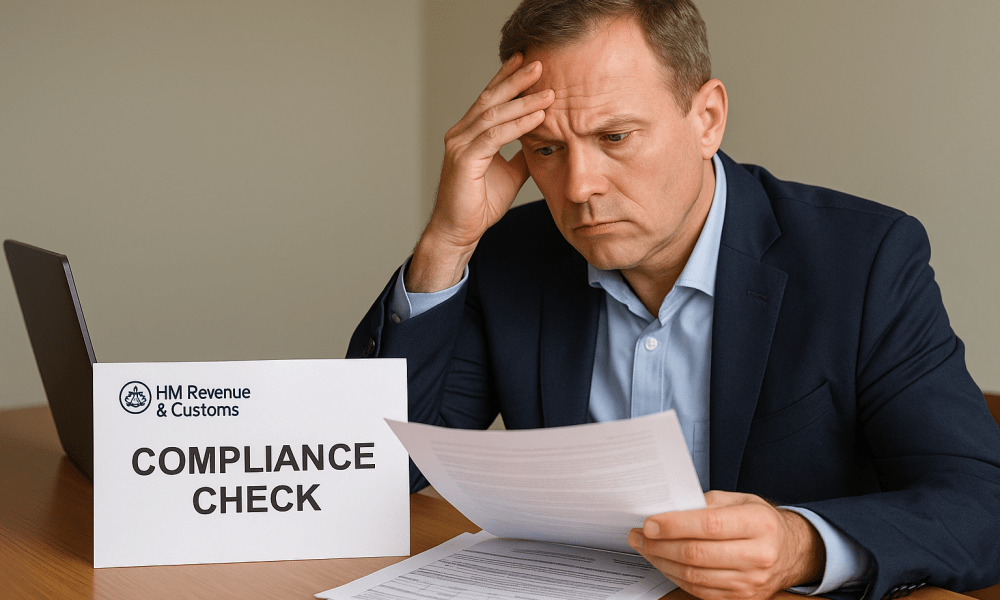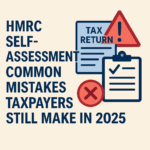How to Handle an HMRC Compliance Check (2025)
What Is an HMRC Compliance Check?
An HMRC compliance check is a formal review conducted by HM Revenue & Customs (HMRC) to verify that individuals and businesses are paying the right amount of tax and claiming reliefs correctly.
➡️ In simple terms: It’s HMRC’s way of checking that your financial records are accurate — not necessarily that you’ve done anything wrong.
HMRC performs these checks:
- To confirm that you’ve paid the correct amount of tax.
- To ensure tax reliefs and allowances have been claimed properly.
- To encourage fairness and prevent errors or tax evasion.
🧾 Fact (2025 update): HMRC has increased digital risk-based targeting using AI tools through the “Connect” system, analysing over 600 million data points daily to detect discrepancies in tax returns.
Why HMRC Might Contact You for a Compliance Check
There are two main reasons you might be selected:
1️⃣ Risk-based selection
HMRC’s algorithms flag your tax return if:
- Your income or expenses look inconsistent compared to previous years.
- You’ve claimed large or unusual deductions.
- There’s a mismatch between your declared income and bank data.
- You file returns or make payments late.
2️⃣ Random selection
Some checks are completely random — part of HMRC’s effort to keep the system fair. Even a fully compliant taxpayer can be reviewed periodically.
💡 Tip: Regularly reconciling your accounts and filing early reduces your audit risk score.
Step-by-Step: How to Handle an HMRC Compliance Check
Here’s a quick overview you can follow immediately if you receive an HMRC letter:
| Step | Action | Description |
|---|---|---|
| Step 1 | Read the HMRC letter carefully | Identify which tax year or area (e.g., VAT, PAYE, income tax) is being reviewed. |
| Step 2 | Don’t panic — but act fast | You normally have 30 days to respond. Mark deadlines clearly. |
| Step 3 | Contact a tax adviser or accountant | A specialist can manage communications and reduce errors. |
| Step 4 | Gather your records | Collect invoices, receipts, ledgers, and bank statements. |
| Step 5 | Reply clearly and honestly | Never ignore a letter — unresponsiveness leads to penalties. |
| Step 6 | Attend meetings (if required) | You can have your adviser present at any interview or site visit. |
| Step 7 | Review HMRC’s findings | Ask for explanations of any tax adjustments or penalties. |
| Step 8 | Appeal if you disagree | File an appeal within 30 days or use Alternative Dispute Resolution (ADR). |
How to Respond to an HMRC Compliance Check Letter
When you receive an HMRC letter:
- Check the authenticity — genuine letters will come from official HMRC addresses or your online account.
- Note the deadline — typically 30 days from the date on the letter.
- Review what HMRC is asking for — sometimes it’s only one area (called an aspect enquiry).
- Seek professional help if unsure — especially if you’ve received a Schedule 36 notice (formal request for information).
- Prepare documentation early — provide full, well-organised evidence to support your return.
🚫 Never ignore HMRC’s letter. Doing nothing could result in daily penalties up to £60 per day after the initial fine.
Documents HMRC Usually Requests
HMRC may ask for:
- Business accounts, profit & loss statements.
- Bank statements (personal and business).
- VAT returns and invoices.
- PAYE records (if employing staff).
- Contracts and client payment records.
Organise these by year and category. Use digital folders labelled by tax period for quick access — this makes your compliance process smoother and faster.
Common Triggers for HMRC Checks in 2025
As of November 2025, HMRC has intensified reviews in the following areas:
- Crypto transactions (underreporting gains).
- R&D tax credit claims (incorrect or inflated submissions).
- VAT refund anomalies.
- Property rental income and Airbnb earnings.
- Offshore income and international asset transfers.
🧠 Pro Insight: HMRC’s “Offshore Asset Disclosure” and “Making Tax Digital” (MTD) programs are now fully integrated — making non-compliance easier to detect.
Possible Outcomes of an HMRC Check
Once HMRC reviews your case, you’ll receive one of these decisions:
| Outcome | Meaning | What You Should Do |
|---|---|---|
| ✅ No changes | Your return is accepted. | Keep good records for future reviews. |
| ⚠️ Tax adjustment | You owe extra tax or interest. | Pay promptly to avoid late interest. |
| 💷 Refund due | You overpaid tax. | HMRC will issue repayment plus interest. |
| ❌ Penalty imposed | HMRC found deliberate or careless behaviour. | Seek professional advice and consider appeal. |
HMRC Penalty Rates (2025 Update)
| Behaviour | Penalty % of Tax Due | Reduction if You Disclose |
|---|---|---|
| Non-deliberate | 0% – 30% | Up to 100% reduction |
| Deliberate | 20% – 70% | Partial reduction possible |
| Deliberate & concealed | 30% – 100% | Minimal reduction |
Penalties can be reduced when you tell, help, and give — meaning you disclose the error, assist HMRC, and provide full details quickly.
What If You Disagree with HMRC’s Decision?
You have several options:
- Ask for an internal review — HMRC may reconsider based on additional evidence.
- File a formal appeal within 30 days.
- Use Alternative Dispute Resolution (ADR) for mediation before tribunal.
- Escalate to the First-Tier Tribunal (Tax) if necessary.
⚖️ Tip: Keep written copies of all communications. They’re vital if you proceed to appeal.
How to Avoid HMRC Checks in the Future
To reduce your chances of future compliance checks:
- File returns on time and accurately.
- Keep 6+ years of financial records.
- Declare all income sources (including crypto and overseas).
- Use HMRC’s digital tools under Making Tax Digital (MTD).
- Work with a qualified accountant for year-end tax filings.
🔍 Bonus Tip: Review HMRC’s “Agent Compliance Updates” quarterly. They outline new areas of focus — from digital platforms to hybrid work deductions.
FAQs About HMRC Compliance Checks (2025 Edition)
Q1. Is an HMRC compliance check the same as a tax investigation?
Not exactly. A compliance check is a review of specific areas, while a full investigation examines your entire tax position.
Q2. How long does an HMRC compliance check take?
Typically 3–6 months, but complex cases (especially international ones) can last up to 18 months.
Q3. What if I can’t meet HMRC’s deadline?
You can request an extension in writing — HMRC may grant one if you have a valid reason.
Q4. Can I refuse an HMRC visit?
You can refuse informal visits, but not official ones under a Schedule 36 Notice. Always seek professional advice before refusing.
Q5. What’s the biggest mistake people make?
Ignoring HMRC or trying to fix records after receiving a notice. Always respond honestly and promptly.
Q6. Will hiring a tax adviser help?
Absolutely. An experienced tax adviser can manage communications, reduce penalties, and speed up resolution.
Final Thoughts
Handling an HMRC compliance check doesn’t have to be stressful — if you stay calm, respond quickly, and maintain transparency.
Think of it as an opportunity to demonstrate that your records are sound and your business is compliant.
🧾 Remember: Good bookkeeping today prevents compliance headaches tomorrow.






